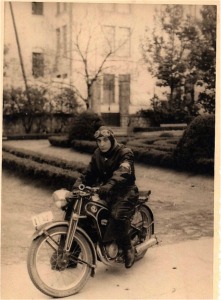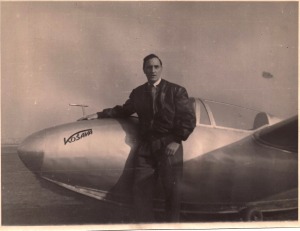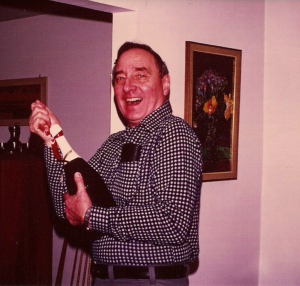Adrian Vladimir Kisovec was one of the many unsung heroes from World War II who Tom Brokaw of NBC News honored with his bestselling book, The Greatest Generation.
 True to form, Adrian’s modesty was such that it took over 10 years of my constant prodding to get him to share details of his wartime adventures as a resistance fighter in Nazi-occupied Yugoslavia. He would eventually tell and retell his story more than a thousand times … often with such adrenaline you’d think he were back in that place and time.
True to form, Adrian’s modesty was such that it took over 10 years of my constant prodding to get him to share details of his wartime adventures as a resistance fighter in Nazi-occupied Yugoslavia. He would eventually tell and retell his story more than a thousand times … often with such adrenaline you’d think he were back in that place and time.
Mind you, his exploits were more the mischievous feats of Hogan’s Heroes than the derring-dos of Army of Shadows. To be fair, though, Adrian’s stint as a real-life political prisoner was no laughing matter.
All the same, I provided a thoroughly enthralled audience of one every time; not least because he invariably fleshed out his stories with references from his encyclopedic knowledge of world history.
Incidentally, my abiding fascination was tempered with humility because I invariably juxtaposed his wartime experiences with that of both my father and grandfather, which consisted of living relatively idyllic lives in the Caribbean – blissfully ignorant of, and unfazed by, the war raging in Europe.
In any event, it did not take long after the war for Adrian and Bibi, who played Mata Hari as often as housewife back then, to realize that fate had placed them behind that dreaded iron curtain Winston Churchill warned about. And so they were soon applying the cleverness and guile that helped them survive the Nazis towards helping them escape the communists.
Suffice it to know that Yugoslavia’s apparatchiks, secret police, and border guards were no match for their determination and resourcefulness. It was particularly helpful, though, that Adrian, a native Slovene, not only spoke Serbo-Croatian, German, and many other languages fluently, but also inherited the skills of persuasion his father developed as an international lawyer and diplomat; and that Bibi, a native Serbian, was equally fluent and inherited the accounting and management skills her mother developed as the matriarch of a palatial home and landlord of many rental properties.
 They finally settled in the United States in the late 1950s. Interestingly enough, with McCarthyism still in the air, none of the major aeronautical companies would give Adrian the time of day. This is why he was eternally grateful to the Schweizer brothers, of the Schweizer Aircraft Corporation, for giving him the opportunity to begin his work experience here in his chosen profession, which was exceedingly rare for immigrants from communist countries.
They finally settled in the United States in the late 1950s. Interestingly enough, with McCarthyism still in the air, none of the major aeronautical companies would give Adrian the time of day. This is why he was eternally grateful to the Schweizer brothers, of the Schweizer Aircraft Corporation, for giving him the opportunity to begin his work experience here in his chosen profession, which was exceedingly rare for immigrants from communist countries.
By this time, he had earned his advanced degrees and become an acclaimed aeronautical engineer, having gained valuable experience with the Yugoslav Aeronautical Design Bureau and honed his skills designing sailplanes for (and sometimes flying them in) international competition. In fact, with respect to the latter, his two-seater Ikarus Košava won the 1954 World Gliding Championship in England.
But nothing distinguished his career quite like his thirty years with the Boeing Corporation, during which time he won numerous patents for inventions in aeronautics and wind energy. Most notable among them was one for combining rotating wings with jet engines, which gave rise to the V-22 Osprey (V/STOL) that finally took flight in March 1989.
 As my reference above to his war stories indicates, Adrian was a raconteur nonpareil (a distinction he would relish as much for what it says about his story telling as for what it invites him, as accomplished linguist, to share about the etymology of these two words). But anyone who has ever had the pleasure of sitting at a dinner table with him can attest to his engaging repertoire of life stories (spanning so many years and so many continents), which free-flowing wine made not only more lively but also more creative.
As my reference above to his war stories indicates, Adrian was a raconteur nonpareil (a distinction he would relish as much for what it says about his story telling as for what it invites him, as accomplished linguist, to share about the etymology of these two words). But anyone who has ever had the pleasure of sitting at a dinner table with him can attest to his engaging repertoire of life stories (spanning so many years and so many continents), which free-flowing wine made not only more lively but also more creative.
I know, however, that he shared his more philosophical musings about life and death with only a select few. Which is why all I can say, without betraying confidences, is that he was as informed and engaging when discussing metaphysics as he was when discussing, “What’s going on in the world?”
Adrian died of natural causes on December 30 at his home in Arlington, Virginia. Besides Bibi, his devoted wife of 68 years, he is survived by their daughter Katherine, the love of my life for the past 28 years; his niece Ana, her husband Noel and their daughter Alexandra; and his niece Maya.
He was 96.
Farewell, Adrian.